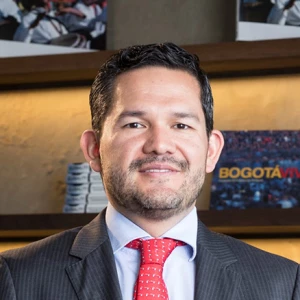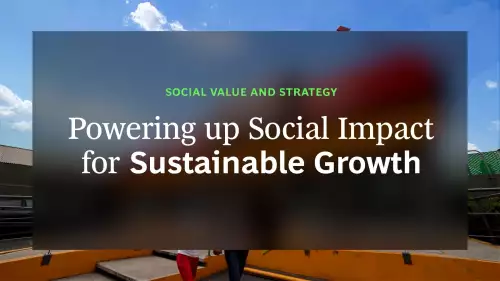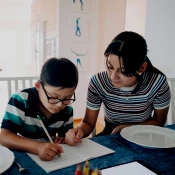The Obstacle
FEMSA is a major Mexican multinational company primarily involved in the beverage, retail, and fintech sectors. Although social impact was cornerstone in its values, there wasn’t a dedicated social impact team or a unified social impact strategy. This also meant that there was a risk of overlap and competition with some existing sustainability efforts.
Because of FEMSA’s size, aligning priorities across different business units and stakeholders was a key component of the challenge, which required the formulation of a strategy to both bring social initiatives in lockstep with broader business goals and deliver enhanced operational efficiencies. FEMSA’s three business units each required unique, tailor-made approaches—the circle to square would be finding common transversal elements across the company that would also allow for specific actions within each business unit.
The diverse range of intended beneficiaries was another challenge, with groups ranging from employees and communities where FEMSA operates to such underrepresented groups as women, immigrants, elderly people, local suppliers, and SMEs for community economic inclusion.
Our Approach
The strategy sought to strengthen FEMSA’s position as a leader in social value within Latin America by supporting community well-being and economic inclusion and to create measurable operational impact. To that end, BCG opted for a cohesive social value strategy that could (a) maximize impact, (b) align with business goals, and (c) improve operational efficiency.
As a first step, an extensive diagnostic was carried out. This comprised multiple executive interviews and more than 1,500 client surveys and 300 employee surveys to corral and analyze the voices and views of all stakeholders. BCG also benchmarked 35+ companies, identifying 16 key social value topics relevant to the activities of FEMSA’s business units. Tools and processes were used to evaluate FEMSA’s initiatives and identify opportunities where it could lead or shape the field.
Next, to prioritize the flagship initiatives, BCG conducted workshops and leadership meetings that resulted in the narrowing down of such candidate programs from 16 topics to 7. Three topics were ultimately selected, with the remainder established for ongoing review according to their maturity levels.
Collating the results of these activities, we jointly defined a unifying North Star vision to position FEMSA as a socially responsible leader. The vision incorporated a scalable operating model comprising (1) centralized governance to enable regional teams to adapt programs to local needs while maintaining strategic alignment; and (2) ESG metrics within executive incentive plans to align leadership performance with social goals.
The Result
We … believe in the power of being good neighbors and collaborating with the local community in strengthening the social fabric of that community and empowering underrepresented populations within those communities. — Eva Fernandez
The end result was a strategy that distilled scattered initiatives into a single integrated framework centered on high-priority topics and flagship programs aligned to business priorities that could be scaled across FEMSA’s regional operations under the umbrella of “transforming everyday lives through partnering with our extended families to promote their economic development and wellness.”
That translated into the following two main flags:
- Promoting the holistic development of our collaborators and their families, such as upskilling and well-being initiatives provided to FEMSA employees and their families, including financial literacy workshops, support in housing, education, and health support services.
- Strengthening the social fabric of our communities, supporting local SMEs, job creation programs, and financial inclusion services aimed at building local economic resilience and increasing access to essential services in the community, particularly those centered around care, health, and education.
This, in turn, promises (1) enhanced economic stability and upward mobility for employees and community members, leading to improved financial health and greater access to career opportunities; (2) improved physical and mental health among FEMSA employees and their families; and (3) greater inclusion of underrepresented groups in the workforce and FEMSA’s local economies, with increased access to financial services, stable employment, and skills development for sustainable economic participation.
For FEMSA, this has translated into the following:
- A unified understanding of its social impact mission based on a data-informed strategy with prioritized goals
- Clear flagship areas to guide capacity and resources
- Enhanced employee and family well-being through training, mentorship, and health support services
For communities and beneficiaries, this is leading to
- Improved economic stability and upward mobility for employees and communities
- Greater inclusion of underrepresented groups
- Access to financial services, stable employment, and skills development
- Support for local SMEs, job creation programs, and financial inclusion initiatives, thereby fostering local economic resilience
- Incentives and accountability mechanisms with BCG-integrated ESG (Environmental, Social, and Governance) metrics built into executive incentive plans
FEMSA will continue to build on its strengths by amplifying programs that have already achieved substantial milestones prior to defining this strategy, such as the following:
- 39% increase in well-being training programs for employees and their families
- 100% of employees covered with new initiatives for mental health
- 2.8 million beneficiaries reached through community well-being programs
- 356,000 hours of corporate volunteering
- 69% of supplies sourced locally
Meet More Experts


Explore Our Related Offerings and Insights










